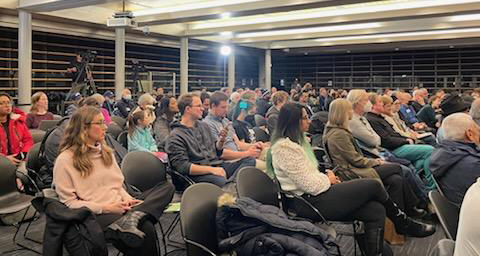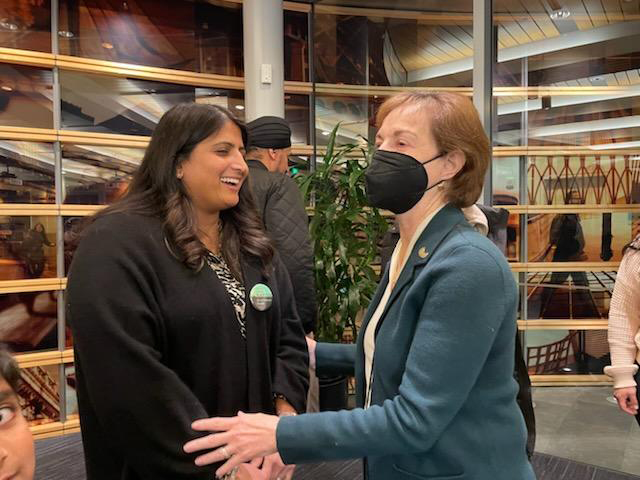By Mahlon Meyer
NORTHWEST ASIAN WEEKLY
Some presented themselves as marginalized, others as insiders.
Each of the candidates for Seattle City Council position 8, at a public forum last night, identified with one or more groups, creating a narrative of belonging, and positioning himself or herself as an insider or outsider respective to the city and its government.
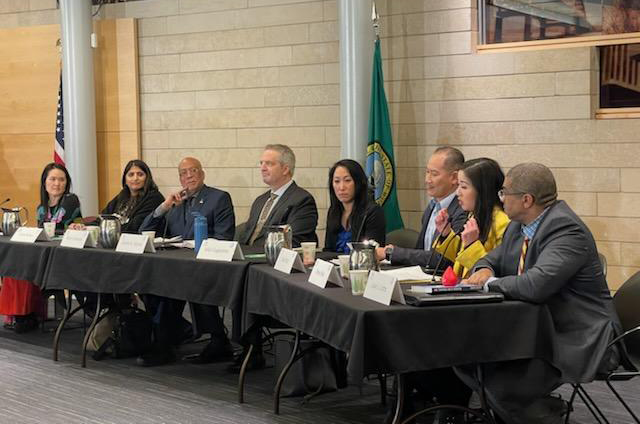
Candidates listen as Tanya Woo (second from right) calls for the lifting up of marginalized voices (Photo by Assunta Ng)
How well each did that seemed in some ways more fundamental than the actual policy pronouncements made.
The two-hour forum was organized by Seattle CityClub, and held at Bertha Knight Landes Room inside City Hall. It involved a series of questions, some posed by community groups, some by the audience.
Going into the event, Tanya Woo, activist and community leader from the Chinatown-International District (CID), who recently came close to unseating an incumbent, perhaps had the most to lose, since she was endorsed by more council members than any other candidate during nomination proceedings on Jan. 12.
Indeed, some of the questions seemed particularly barbed, although not just for her, but also for other candidates.
Moreover, a lightning series of questions at the end were so minutiae policy-oriented, most candidates seemed stumped.
All candidates endorsed public safety, homelessness, and affordable housing as priorities.
Staking out an identity
A subtlety for the Asian American candidates was how they handled the issue of their ethnic identity—as members of a community that has suffered centuries of marginalization and, more recently, years of anti-Asian hate—while remaining committed to representing an entire city, since position 8 is city-wide.
Five of the eight candidates are Asian American, perhaps a nod to the increasing size and sway of that community in Seattle, which is now 18% and the fastest growing.
Only Neha Nariya, whose family runs the Civic Hotel where homeless people now live with city funding, and Woo made a point of overtly mentioning their connections to their ethnic communities.
Nariya mentioned coming from “the greater Asian community,” while Woo said she had fought against the city’s “discrimination against one of the most vulnerable neighborhoods in the nation”—the CID.
But another Asian American candidate identified himself with other vulnerable communities. Linh Thai, a former military intelligence officer who later led veterans in service projects, came out by saying he had mental health problems after he left the military and later added—in response to a question about encampment sweeps and was city money wasted when most people returned to the streets—that he had also experienced homelessness.
Outsider versus insider?
Thus, in a sense, the lines were drawn—outsider versus insider. The other two Asian American candidates represented themselves primarily as insiders to government, with Vivian Song drawing upon her experience as a member of the Seattle School Board and Mari Sugiyama referring to her experience managing grants and contracts for community groups for the city.
Even their tones and affect at times seemed to reflect their positionality. Woo was sometimes breathless and often passionate and, in her closing remarks, referred to her work lifting the voices of a whole community of refugees, immigrants, and the disenfranchised.
“To do that on a higher level would be amazing,” she said, with the fervor and tremor of her street speeches.
Nariya spoke about her children in a warmly compassionate way, for instance when her 4-year-old son learned citizenship questions and brought them to school.
Thai, who is the younger brother of state Rep. My-Linh Thai, made personal appeals to the audience and to the other candidates, for instance repeatedly hand grasping with Juan Cotto, another of the candidates.
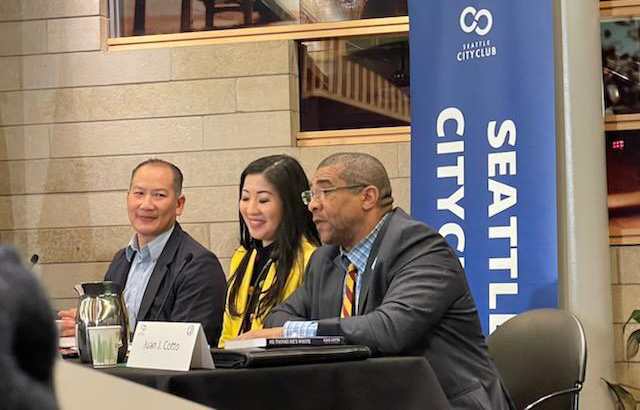
Linh Thai (left) and Tanya Woo (middle) react to a personal anecdote shared by Juan Cotto (right). Photo by Assunta Ng
Song, meanwhile, stayed consistent with themes about tackling even the most-tricky subjects, such as how to cut the city budget, by often returning to her time on the Seattle School Board, where the board recognized three priorities and used those to guide their work.
Sugiyama, for her part, came across calm and almost as if she were still in a department meeting in City Hall, relating questions to the many groups she funded. She did several times, however, talk about her parents, well-known activists for the Asian American community, and when she did, her affect changed and she seemed to grow lighter. For instance, she described going to vote with her mother and the “fun” of being able to push through the paper ballots and pull a curtain to create an enclosed space.
Other belongings
As for the other candidates, each drew upon personal experience and affiliation.
Capt. Steve Strand, the west precinct commander for the Seattle Police Department (SPD), which covers the CID, mentioned, in the context of many answers, his experiences as a police officer, veteran, and member of the Washington State National Guard. In closing remarks, he named his familiarity with multiple neighborhoods around the city, perhaps suggesting he was blind to class lines.
Mark Solomon, a crime prevention coordinator for SPD, drew several times upon his understanding of the BIPOC (Black, Indigenous, and People of Color) community, for instance when he said his family had been able to pass down his grandparents’ home to him—a rare case in his community. Still, in his closing remarks, he referred to three decades of experience working with all neighborhoods to position himself for a city-wide position.
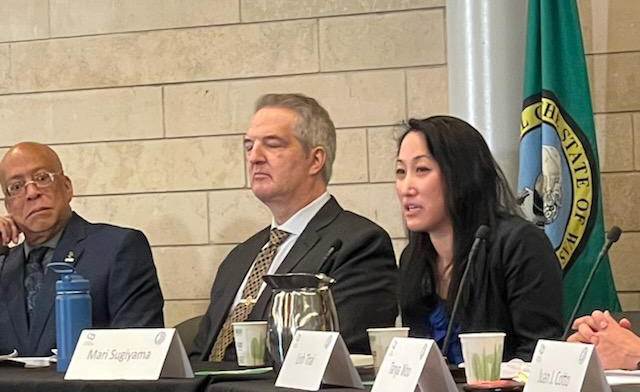
With Mark Solomon (left) and Capt. Steve Strand (middle) beside her, Mari Sugiyama (right) vouches for her experience granting contracts to community groups (Photo by Assunta Ng)
Cotto, a leader of blood donation at local and state levels and a civic leader, made many answers overtly personal. For instance, responding to the question about how to increase BIPOC ownership of housing, he mentioned his specific work with an organization that finds affordable housing and engages in down payment assistance. When the candidates were asked about increasing support for mental health funding, Cotto said his own wife was a mental health therapist.
Orderings
Oftentimes, a person’s success in answering a question seemed to a large extent determined by in what order he or she was called. Those who were asked first sometimes stumbled. The emcee, Alicia Crank, seemed somehow aware of these dynamics when at one point she said to the audience, “Who haven’t I picked on yet?” And chose to start with Sugiyama for the next round of questioning. Still, at another point, she said the selection of who would be asked first was “random.”
Adding to the optics of discordance was the seating of the candidates. The two employees of the SPD, Solomon and Strand, were seated side by side in the center of the table, in a somewhat commanding position, with the other candidates trailing off to the sides.
Similarities
At times, however, candidates gave surprisingly similar responses.
Asked specifically, for instance, what they would cut from the city budget, to make up a $250 million deficit, no candidate came up with an actual concrete answer.
All either simply said they “didn’t know” (Cotto and Thai) or would establish an audit of some kind (Solomon, Nariya, Song, Sugiyama, Strand) or, similarly, “metrics of success” (Woo) to determine cuts.
But the manner in which they responded, at a vulnerable moment, perhaps pointed to their ability to work collegially with their colleagues, a criterion laid out by the city council.
Thai, for example, immediately said he “agreed” with Cotto.
Strand mentioned Councilmember Mark Saka by name and said he would endorse his proposal for an audit.
Sugiyama, as if capturing the slight unease that many of the candidates seemed to have had with the question, described it as “kind of a set up.”
Upzoning
As for upzoning, answers reflected a wide variety of experiences and values.
Woo, the first one asked, blanketly said, “We have to build more affordable housing,” for instance, to allow seniors to age in place, and referred to her experience creating affordable housing in her family’s building.
Thai, who said he was a renter, and so understood equity issues, said “every neighborhood” must upzone, but perhaps in different ways. “We all must share the burden,” he said.
Sugiyama said the question ignored nuances of distinguishing when single family housing is a source for building generational wealth for marginalized communities. Africatown and SCIDpda were models the city could look to, she said.
Strand said upzoning occurred along transit lines and in urban villages. “I’m concerned about the displacement of underserved communities,” he said.
Solomon said the loss of billions of dollars in equity in the Black community was due to city policies. “I’m concerned about gentrification,” he said.
Nariya said increasing the housing stock in Seattle will lower prices. “I support building housing in all communities,” she said.
Song seemed less radical, saying any changes “wouldn’t happen overnight.” So the council would have to undertake a concerted process of engaging stakeholders in different communities, she said.
Pride and prejudice
One question that may have come out of recent media coverage criticizing Woo for having a less than consistent voting record at the same time sparked shows of pride on the part of other candidates.
For instance, Thai said he had joined the service for the very purpose of fighting to defend the right to vote.
Strand and Solomon said they had voted absentee when they were serving in the military overseas.
Song described her voting record in Washington state as “perfect.”
For her part, Woo said she had learned from her mistakes and had enlisted many others to vote, adding that in her community, voting is not always considered a way to make any substantive change, referring to the long history of discrimination against the CID.
“How do you engage people who are the farthest away from government, engage those who don’t receive any benefit from the government?”
She talked about filling City Hall and the King County Council with the disenfranchised—and vowed to continue her work if selected.
Mahlon can be reached at info@nwasianweekly.com.




